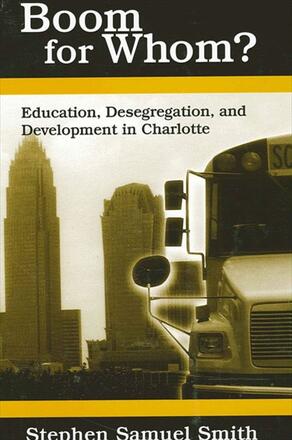
Boom for Whom?
Education, Desegregation, and Development in Charlotte
Alternative formats available from:
Explores political and educational aspects of Charlotte's nationally praised school desegregation efforts.
Description
Bringing a new perspective to Charlotte's landmark school desegregation efforts, Stephen Samuel Smith provides a multi-faceted history of the nationally praised mandatory busing plan and the court battle that led to its ultimate demise. Although both black and white children benefited from busing, its most ongoing consequences were not educational, but the political and economic ones that served the interests of Charlotte's business elite and facilitated the city's economic boom. Drawing on urban regime theory, Smith shows how busing enhanced civic capacity and was part of a political alliance between Charlotte's business elite and black political leaders. This account of Charlotte's history has national implications for desegregation, urban education, efforts to build civic capacity, and the political involvement of the urban poor.
Stephen Samuel Smith is Professor of Political Science at Winthrop University.
Reviews
"…Smith … shows that paying close attention to the local context produces a more nuanced picture of desegregation issues than approaches that focus on the national level. " — H-Net Reviews (H-Urban)
"An important and theoretically informed analysis of civic capacity which raises important policy questions about the relationship between public education and economic development. " — Clarence Stone, coauthor of Building Civic Capacity: The Politics of Reforming Urban Schools
"There are real people doing real things throughout these pages. Various viewpoints within both races are clearly articulated, and Smith avoids patronizing or castigating anyone even while criticizing them and their actions. " — Jennifer L. Hochschild, author of Facing Up to the American Dream: Race, Class, and the Soul of the Nation
"Smith demonstrates the ways in which the business elite of Charlotte helped promote school desegregation in that city. Particularly striking is his observation that this commitment to school desegregation was in some instances more superficial than many observers have assumed. " — Davison M. Douglas, author of Reading, Writing, and Race: The Desegregation of the Charlotte Schools
"Smith takes us on a remarkable and tragic journey. The main lesson to be drawn from his study is that in order to improve the education of African American students in urban schools, political mobilization of residents that ultimately results in overturning the city's power structure of business elites is necessary. This lesson is stunning, and vitally important for the educational community to learn. " — Jean Anyon, author of Ghetto Schooling: A Political Economy of Urban Educational Reform